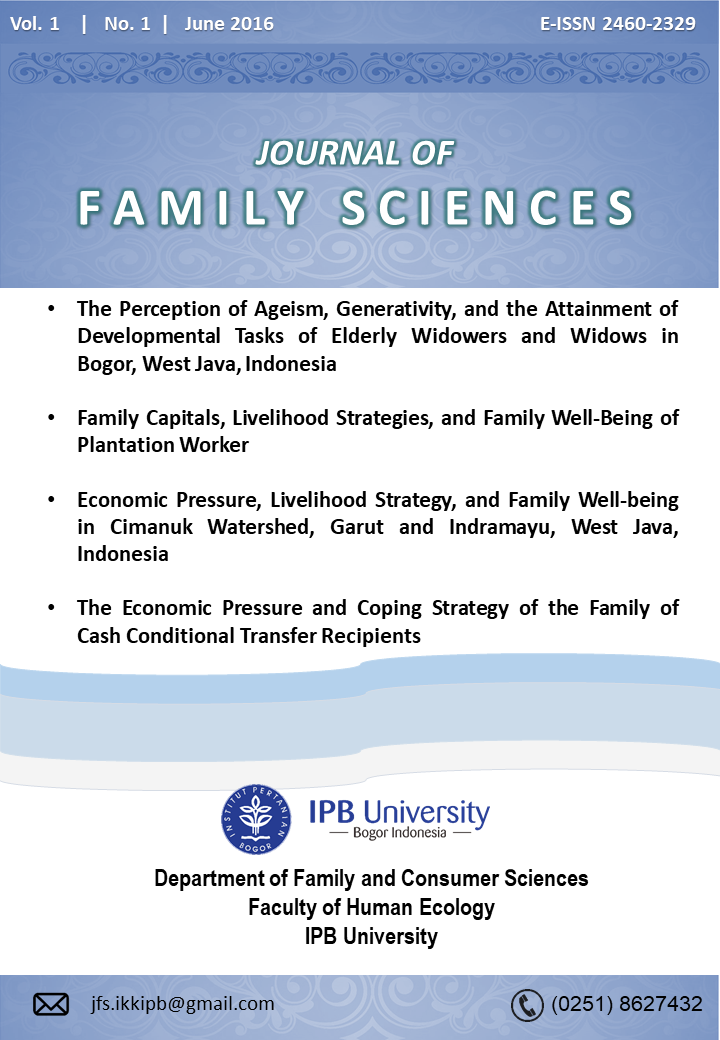The Economic Pressure and Coping Strategy of the Family of Cash Conditional Transfer Recipients
Abstract
Cash Conditional Transfer (CCT) or Program Keluarga Harapan (PKH) is one of the attempts of Indonesian government to alleviate poverty. This study conducted in eight villages in Dramaga District, Bogor Regency for six months. This study aimed to analyze the difference of economic pressure and families coping strategies of economic functions between pre and post the family got CCT’s funds and to analyze the relationship of socioeconomic and demographic characteristics, economic pressure and coping strategies of economic functions. By using systematic random sampling, this study produced 150 samples. Family size, amount of debt, the ratio of debt and assets, and economic pressure significantly and positively correlated with the total coping strategies both in pre and post-CCT. On the other hand, the total coping strategies both in the pre and post-CCT also significantly and negatively correlated with the level education of wives. In addition, the husbands and wives age significantly and positively related to the coping strategies during post CCT, while the total family income correlated significantly and negatively.
Downloads
References
Amendah, D. D., Buigut, S., & Mohamed, S. (2014). Coping strategies among urban poor: Evidence from Nairobi, Kenya. PLoS ONE, 9(1), 1-8. doi: 10.1371/journal.pone.0083428.
Bourguignon, F., Ferreira, F., & Leite, P. (2002). Ex-ante evaluation of conditional cash transfer programs: The case of Bolsa Escola (Policy Research Working Paper No. 2916, World Bank, Washington, DC. doi: 10.1596/1813-9450-2916.
Conger, R. D., Wallace, L. E., Sun, Y., Simons, R. L., McLoyd, V. C., & Brody, G. H. (2002). Economic pressure in African American families: A replication and extension of the family stress model. Developmental Psychology, 38, 179–193.
Fiszbein, A. & Schady, N. (2009). Conditional Cash Transfer: Reducing Present and Future Poverty. Washington DC: The International Bank for Reconstruction and Development/The World Bank.
Gu´nther, I., & Harttgen, K. (2009). Estimating Households Vulnerability to Idiosyncratic and Covariate Shocks: A Novel Method Applied in Madagascar. World Development, 37(7), 1222–1234. doi: 10.1016/j.worlddev.2008.11.006.
Hastuti, D., & Milyawati, L. (2009). Dukungan keluarga, pengetahuan, dan persepsi ibu serta hubungannya dengan strategi koping ibu pada anak dengan gangguan Autism Spectrum Disorder (ASD) [Family Support, mother's knowledge and perception of asd, and its correlation with coping strategy of mothers with Autism Spectrum Disorder (ASD) children]. Jurnal Ilmu Keluarga dan Konsumen, 2(2), 137-142. Retrieved from http://journal.ipb.ac.id/index.php/jikk/article/view/5170/3566.
Kusumo, R. A. B., Sunarti, E., & Pranadji, D. K. (2008). Analisis Peran Gender serta Hubungannya dengan Kesejahteraan Keluarga Petani Padi dan Hortikultura di Daerah Pinggiran Perkotaan [The role of gender in coping strategies and family resource management and its relationship with the family welfare of rice and horticulture farmers in the urban fringe]. Media Gizi dan Keluarga, 32(2), 52-64.
Puspitawati, H. (2012). Gender dan Keluarga [Gender and Family]. Bogor, Indonesia: IPB Press.
Robila, M. (2006). Economic pressure and social exclusion in Europe. The Social Science Journal, 43, 85-97. doi: 10.1016/j.soscij.2005.12.009.
Rosidah, U., Hartoyo, & Muflikhati, I. (2012). Kajian Strategi Kopingdan Perilaku Investasi Anak Pada Keluarga Buruh Pemetik Melati Gambir. [Study on family coping strategy and investment behavior on children of jasmine officinale labor families]. Jurnal Ilmu Keluarga dan Konsumen, 5(1).
Son, H. H. (2008). Conditional cash transfer programs: An effective tool for poverty alleviation? (Economics and Research Department Policy Brief Series No. 51). Retrieved from http://www.adb.org/sites/default/files/publication/28104/pb051.pdf.
Statistics Indonesia. (2012). Official Statistics News. Retrieved from http:// www.bps.go.id/?news=981.
Statistics Indonesia. (2016). Number of Poor People by Province, 2013-2015. Jakarta, Indonesia: Author.
United Nations Development Program. Human Development Index trends, 1980–2012. Retrieved from http://hdr.undp.org/hdr4press/press/outreach/figures/HDI_ Trends_2013.pdf.
Voydanoff, P., & Donnelly, B. W. (1988). Economic distress, family coping, and quality of family life. In P. Voydanoff, & L. C. Majka (Eds.), Families and economic distress: Coping strategies and social policy (pp. 97-117). Newbury Park, CA: Sage.
Zepeda, E. (2006). Do CCTs reduce poverty? (IPC One Pager No. 21). Retrieved from http://www.ipc-undp.org/pub/ IPCOnePager21.pdf.
Authors who publish with this journal agree to the following terms:
- Authors retain copyright and grant the journal right of first publication with the work simultaneously licensed under

This work is licensed under a Creative Commons Attribution 4.0 International License. that allows others to share the work with an acknowledgement of the work's authorship and initial publication in this journal. - Authors are able to enter into separate, additional contractual arrangements for the non-exclusive distribution of the journal's published version of the work (e.g., post it to an institutional repository or publish it in a book), with an acknowledgement of its initial publication in this journal.
- Authors are permitted and encouraged to post their work online (e.g., in institutional repositories or on their website) prior to and during the submission process, as it can lead to productive exchanges, as well as earlier and greater citation of published work (See The Effect of Open Access).



_001.png)



